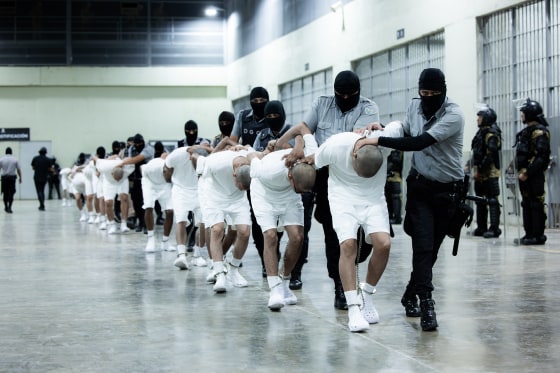WASHINGTON — The words of President Donald Trump and members of his administration undermined the government's contention at a court hearing Wednesday that the men deported from the country under the Alien Enemies Act and delivered to El Salvador were not in the constructive custody of the United States.
At a hearing Wednesday evening, Chief U.S. District Court Judge James Boasberg questioned a Justice Department attorney over whether Trump was telling the truth when he said he could secure the release of Abrego Garcia from the CECOT facility in El Salvador.
Boasberg used Trump’s own words, as well as statements from press secretary Karoline Leavitt and Homeland Security Secretary Kristi Noem, to chip away at the government’s contention that those incarcerated at CECOT in El Salvador were not in the constructive custody of the United States.
“Constructive custody” refers to the legal notion that people can be held at the behest of the government even if they are not held in its physical custody.
Trump said last week that he “could” have Garcia returned to the United States with a phone call, while Leavitt said the United States was paying El Salvador “approximately $6 million” to keep the men and Noem said CECOT was “one of the tools in our tool kit” that the United States could use.
“Is the president not telling the truth, or could he secure the release of Mr. Abrego Garcia?” Boasberg asked Deputy Assistant Attorney General Abhishek Kambli, who was representing the government Wednesday.
“Was the president telling the truth” when he said he could pick up the phone and secure Garcia’s release or not? Boasberg asked.
“That goes towards the president’s belief about influence he has,” Kambli responded, saying, "Influence does not equate to constructive custody."
Under questioning from Boasberg, Kambli said a "grant" dated March 22 that was described as being for law enforcement needs related to the 238 men alleged to be Tren de Aragua members who were recently deported to El Salvador. Kambli confirmed that “grants were made” that “can be used for detention of these individuals.”
Boasberg said the plaintiffs had “a lot of facts in your favor” in arguing that the United States had what is called “constructive custody” of the men — which the Trump administration has argued in and out of court it does not have. Boasberg questioned Kambli about whether the government would concede that transferring people to CECOT without due process would mean the government had violated their rights.
“I don't know if I would put it in those terms," Kambli replied.
Boasberg has ordered the Trump administration to provide sworn declarations from administration officials regarding the issue of who exactly has custody of the people at CECOT.
Boasberg has ordered lawyers from the American Civil Liberties Union and Democracy Forward who brought the lawsuit to review the information and to decide by Monday whether to request discovery — and, if so, exactly what questions, depositions and documents they are requesting. After that, Boasberg will decide what to order the government to produce, if necessary.
The Supreme Court last month lifted Boasberg's order, which temporarily blocked the administration from sending members of Tren de Aragua to El Salvador under the Alien Enemies Act, but it did not reach a decision on the merits of Trump's invocation of the act. Last week, a Trump-appointed judge became the first to strike down the administration's use of the act, which had previously been deployed only during the War of 1812, World War I and World War II.
While the Trump administration proclaimed that it won the Supreme Court argument, Boasberg questioned Kambli about the decision, noting that the court had not reached the merits of the administration's invocation of the Alien Enemies Act. Boasberg asked whether Kambli acknowledged that the Supreme Court did not reach the arguments about the administration's use of the act itself, and Kambli conceded that it "did not analyze that precise issue."
"I assume that's a yes," Boasberg replied.
CORRECTION (May 7, 2025, 8:45 p.m. ET): A previous version of this article misspelled the last name of the White House press secretary. It is Leavitt, not Levitt.


